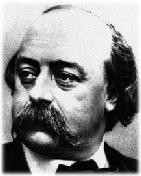 Gustave Flaubert (1821-1880) Gustave Flaubert (1821-1880)
"Madame Bovary. C’est moi." said
Gustave Flaubert, describing his sense of connection with the
agony and emotional suffering of his most noted heroine. Flaubert
was born in Rouen, Normandy. As the son of a successful surgeon,
he was introduced early on to life’s realities of illness
and death. Studying briefly under his father, Flaubert’s
childhood and early adulthood were marked by the atmosphere of
the hospital, of mourning, and of suffering. In 1840, he left for
Paris, where he briefly studied law, but he ended his legal
studies in favor of a writing career after he failed his second
year law exams.
Although born into a bourgeois family of doctors, Flaubert’s life and writings were colored by an intense loathing for the bourgeois class and the petty self-deception which he considered to be integral to such a lifestyle. His first and most well-known novel, Madame Bovary (1857) is weighted with images of a vain and hollow society of dim-witted characters, an image which is in harmony with his distaste for the bourgeois society. First appearing in Revue de Paris, Madame Bovary resulted in Flaubert’s prosecution on the grounds that the work was immoral, though he was acquitted of the accusation. His other works include Salambo (1863) and The Sentimental Education (1869). Flaubert's long novel, Boulevard Et Pécuchet, was left unfinished at his death. Flaubert died of a cerebral hemorrhage on May 8, 1880.
The Classical Library,
© 2001..
|